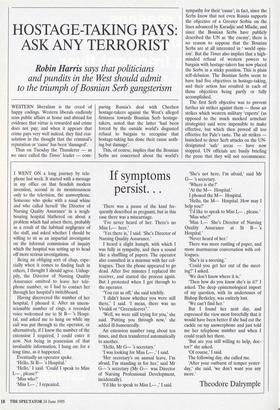HOSTAGE-TAKING PAYS: ASK ANY TERRORIST
Robin Harris says that politicians
and pundits in the West should admit to the triumph of Bosnian Serb gangsterism
WESTERN liberalism is the creed of happy endings. Western liberals endlessly scan public affairs at home and abroad for evidence that virtue is rewarded and crime does not pay; and when it appears that crime pays very well indeed, they find con- solation in the thought that the criminal's reputation or 'cause' has been 'damaged'.
Thus on Tuesday the Thunderer — as we once called the Times' leader — coin- paring Russia's deal with Chechen hostage-takers against the West's alleged firmness towards Bosnian Serb hostage- takers, noted that the latter 'had been forced by the outside world's disgusted refusal to bargain to recognise that hostage-taking has done their cause noth- ing but damage'.
This, of course, implies that the Bosnian Serbs are concerned about the world's sympathy for their `cause'; in fact, since the Serbs know that not even Russia supports the objective of a Greater Serbia on the lines advanced by Karadjic and Mladic, and since the Bosnian Serbs have publicly described the UN as 'the enemy', there is no reason to suppose that the Bosnian Serbs are at all interested in world opin- ion'. But the Times also implies that a high- minded refusal of western powers to bargain with hostage-takers has now placed the Serbs in a sticky position. This is plain self-delusion. The Bosnian Serbs seem to have had five objectives in hostage-taking, and their action has resulted in each of those objectives being partly or fully accomplished.
The first Serb objective was to prevent further air strikes against them — those air strikes which western military 'experts' (as opposed to the much mocked armchair strategists) said were impossible to make effective, but which then proved all too effective for Pale's taste. The air strikes launched to deter Serb attacks on the UN- designated 'safe' areas — have now stopped. UN officials are busily briefing the press that they will not recommence. Mr Major may have won the applause of the House of Commons when he dismissed Mrs Gorman's suggestion that Nato promise to end air strikes in exchange for the hostages' release, but it is the Gorman policy, not the Major policy, which has prevailed.
Second, the Serbs wanted to divert the attention of western public opinion from the suffering of the non-Serb civilian popu- lation. In this too they succeeded. Western government ministers and the western media ceased talking about attacks on `safe' areas or the strangulation of Saraje- vo; only the hostages were important now. A bonus for the Serbs was the impression given by interviews with soldiers' families that British public opinion would not toler- ate casualties.
Third, freed from the threat of air strikes and with the West only concerned about its personnel, the Serbs entered the UN weapons depots and seized back all their own heavy weapons and anyone else's they happened to find there. This, coming• on top of the UN's effective abandonment of Sarajevo, prompted the Bosnian govern- ment into launching an offensive to break the siege of that city before it had built up its supply of heavy artillery to match the Serbs'. The outcome is still in doubt; the terrible scale of Bosnian casualties is not.
Fourth, President Milosevic and his sin- ister chief of security police, Jovan Stanisic, have been allowed to pose as hon- est brokers, gaining not just prestige but leverage in the delicate question of the terms for lifting sanctions against Serbia. There is a large body of evidence that whatever Milosevic's personal rivalry with Karadjic, he is supplying and indeed pay- ing rebel Serb forces and that he remains in close relations with the Bosnian Serb General Mladic, whose men took the UN hostages. Milosevic needs the lifting of economic sanctions to avert a return of hyperinflation in Serbia later this year. Having proved compliant in the hostage crisis, he is now certain to be rewarded.
Finally, the whole purpose of the 'rein- forcements being sent to Bosnia by Britain and France (which was never clear but which for understandable reasons critics hesitated to question publicly) has been significantly changed by events on the ground. Hardly anything is now heard about enforcing UN mandates; the talk is only of `regroupmene, which looks increas- ingly like preparation for withdrawal. The Serbs would probably, other things being equal, prefer the UN to remain a little longer to supervise ethnic cleansing. But given that UN withdrawal seems inevitable some time this year, they want it as soon as possible while they still have the military upper hand. This objective too looks likely , to be fulfilled — under the worst circum- stances for the Bosnians and the best for the Serbs.
Serb hostage-taking has therefore paid — just as has Chechen hostage-taking by achieving suspension of Russian cam- paigning against them indeed, just as most international crimes against norms of morality and law pay. It is simply that we in the West like to convince ourselves that they do not. Genocide pays — almost by definition, since the nation or race destroyed has no chance of reparation or justice. Ethnic cleansing pays. The now nationally homogeneous European coun- tries of Germany, Poland, and the Czech Republic are the result of past successful policies of ethnic cleansing and persecu- tion of minorities, accompanied by revi- sion of frontiers. Terrorism pays. From the Palestinian West Bank to South Africa it is the leaders of terrorist groups who have eventually won power by a strategy of vio- lence against civilians accompanying offers of political negotiation.
Similarly, the IRA would never have been accepted at the negotiating table had they not bombed mainland Britain. They know the real source of their power, even if Westminster politicians do not; that is why they will never agree to hand over most of their weaponry, which they intend to use as an ultimate veto on future demo- cratic decisions of which they disapprove.
The Serbs have learned such lessons and have set about employing techniques of genocide, ethnic cleansing and terrorism to considerable effect. By these means they have managed to hold down the Albanian majority in Kosovo and to drive out large numbers of non-Serbs from Vojvodina, all within Serbia proper. Mean- while, ethnic cleansing in Bosnia and Kraji- na (Croatia) has all but resulted in an ethnically pure West Serbian state: the fin- ishing touches are currently being applied in a campaign of terror in Banja Luka. The great powers have been intimidated into applying an arms embargo — originally proposed by the old Yugoslavia for just this purpose — which keeps the victims weak, and into pressing those victims to make ever greater concessions. And soon the for- mer war criminal Milosevic will be wel- comed back into the international community as a champion of responsibility and model of statesmanship — doubtless to be followed by a more superficially accept- able successor to Karadjick in short order.
Against all the evidence, it is now only western liberals who still imagine that great historic crimes do not pay. In view of the Holocaust, Jews cannot doubt it Muslims, seeing what has happened to their co-reli- gionists in Bosnia, do not doubt it; the Slays of Centr,41 and Eastern Europe, the Balkans and Russia looking at their countries' pre- sent geographical frontiers and ethnic com- position, can hardly doubt it either.
Of course, the moral is not that crime must pay in international affairs, only that it usually does. And a small step towards revising this perverse dictum is offered by the opportunity for honesty about what has happened in the last few weeks in Bosnia.



























































 Previous page
Previous page